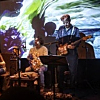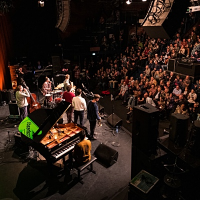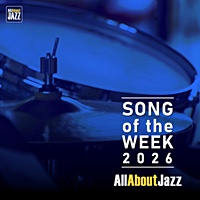Home » Jazz Articles » Wilbur Ware
Jazz Articles about Wilbur Ware
Thelonious Monk, John Coltrane: Thelonious Monk with John Coltrane 1957. Revisited.
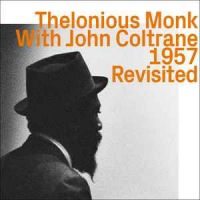
by Stefano Merighi
Ci sono sodalizi artistici che segnano in maniera indelebile la ricchezza creativa dei protagonisti. Tra questi, di sicuro quello tra Thelonious Monk e John Coltrane, anno di grazia 1957. L'estroso pianista e compositore, ancora lontano dal ricevere i riconoscimenti meritati, trova finalmente qualcuno che interpreta le sue partiture con rara dialettica esecutiva: leggerezza e profondità, acume sottile e abbandono istintivo. L'apollineo sassofonista, all'epoca ancora turbato dalla tossicodipendenza, passa dalla frustrazione di un licenziamento da parte di ...
Continue ReadingThelonious Monk: With John Coltrane 1957 Revisited

by Chris May
Once again, the ezz-thetics label has taken some of the finest artefacts of mid-twentieth-century US jazz and sonically restored them, bringing an unprecedented level of clarity, precision and presence. It is no exaggeration to say that the Swiss-based label's work can be compared with the restoration of Michelangelo's frescoes on the ceiling of the Sistine Chapel during the 1980s, both in terms of the quality of the original material and the artistry with which the renovation has been executed. The ...
Continue ReadingA Slightly Latin Set, Wilbur Ware at 100, and the Wailin' Mailman from DC

by David Brown
This week we kick things off with a slightly Latin set with Roland Kirk, Aymee Nuviola, Tito Puente and Michel Camilo. Then three pieces of silver from Horace Silver move into a birthday tribute set to bassist Wilbur Ware. Coming home from the DC Jazz fest had me listening to DC artists such as Ellington and the Wailin' Mailman Buck Hill, and more. Playlist Thelonious Monk “Esistrophy (Theme)" from Live at the It Club-Complete (Columbia) 01:00 Rahsaan Roland ...
Continue ReadingDial "S" for Sonny

by C. Michael Bailey
Pianist Sonny Clark was culturally marginalized in much the same way as his contemporary Elmo Hope—both heroin-addicted jazz musicians in the 1950s: at the time, and romantically, a cliche. Both pianists have been sorely lumped into the “Bud Powell school of bop piano" which superficially may seem accurate until one considers the evolutionary continuum of jazz piano that places both Clark and Hope conceptually and stylistically beyond Powell. Clark was born in Georgia and raised outside of Pittsburgh. ...
Continue ReadingTina Brooks Quintet: The Complete Recordings

by Chris May
Mosaic Records' spring 2020 release The Complete Hank Mobley Blue Note Sessions 1963-70, the second of the label's box sets devoted to the copiously recorded (and rightly so) Hank Mobley, prompts thoughts of another of Blue Note's singular hard-bop tenor saxophone stylists. Unlike Mobley, Tina Brooks was woefully under-recorded, making just four albums under his own name. But like Mobley, Brooks had an instantly recognisable sound, was a spellbinding soloist and was also a gifted composer. In addition to his ...
Continue ReadingSonny Clark: Dial "S" For Sonny

by Greg Simmons
Original copies of Blue Note 1570--Dial “S" For Sonny--are among the rarer Blue Note records, often changing hands for thousands of dollars for even a mediocre copy. That's an awful lot of scratch for a fifty-six year old piece of pressed vinyl and a cardboard sleeve. Fortunately, there are better ways to hear pianist Sonny Clark's debut recording for the fabled label. The Music Matters series of two-disk, 45 rpm vinyl records is winding down after close to one hundred ...
Continue ReadingThelonious Monk: Thelonious Himself
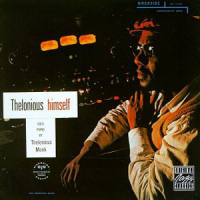
by Stuart Broomer
When producer Orrin Keepnews undertook this album for Riverside in 1957, Thelonious Monk had recorded relatively little as a solo pianist--nine tracks for French Vogue in 1954 and single tracks on Prestige and Riverside LPs. While the Vogue had emphasized Monk's originals and the single tracks were all old tunes, Thelonious Himself (Riverside/OJC, 1957) balanced his unique approach to standards with striking performances of originals. Whether fragmented, dissonant or oddly hesitant, Monk's probing (the usage is literal, heard in the ...
Continue Reading









